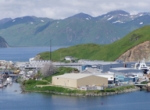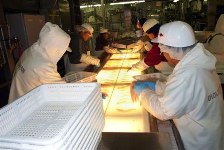
Seafood Processor to Pay $1.9M for Ammonia Discharges
Unisea, which operates in Alaska, allegedly discharged ammonia and other pollutants into Unalaska waters from 2005 to 2008.
U.S. Attorney Karen L. Loeffler announced on March 9 that Unisea, a Seattle-based seafood processing company, whose principal processing operations are conducted in Alaska, has agreed to pay $1.9 million in penalties and will pay for any necessary clean-up costs to settle allegations it violated federal and state laws when discharging ammonia and other waste from its facility on Amaknak Island in Unalaska.
The factual summary contained in the consent decree, signed by the parties and filed in Federal District Court in Alaska, reveals that beginning in 2005, Unisea discharged ammonia and other pollutants from its facility in Unalaska into surrounding waters without a permit in violation of the Clean Water Act, and that it failed to timely notify authorities of two large releases of ammonia from its facility in December 2007, in violation of federal and state environmental reporting laws.
The proposed agreement requires Unisea to pay federal and state civil penalties of $1,909,375. The total penalty is allocated as follows:
- $133,250 is a civil penalty pursuant to Section 109 of CERCLA (aka Superfund),
- $975,000 is a civil penalty pursuant to Section 325 of EPCRA (Emergency Planning and Community Right-to-Know Act),
- $297,000 is a civil penalty pursuant to Section 309 of the CWA, and
- $504,125 is a civil assessment pursuant to Alaska state law.
Unisea will also be required to perform a benthic survey and potential cleanup of the site’s fish waste pile and to implement a comprehensive environmental compliance plan to ensure that future violations do not occur.

Unisea operates its principal seafood processing facility on southeast Amaknak Island, in Unalaska, Alaska. Dutch Harbor, the official name of the city’s port, is the largest port in terms of fish landings in the United States. Unisea produces seafood products from pollock, pollock roe, Pacific cod, black cod, snow crab, king crab, halibut, whitefish meal, and fish oil. According to the underlying complaint, Unisea released anhydrous ammonia, elevated pH, propylene glycol, unscreened seafood processing wastewater, crab waste, stick water, fishmeal, and foam from outfalls at its Dutch Harbor facility from July 2005, to February 2008, in violation of the terms of its National Pollutant Discharge Elimination System permit issued by EPA in 2003. The complaint also alleges that Unisea failed to properly notify authorities of two large ammonia releases in December 2007, approximately 17,000 pounds, which exceeded the reportable quantity for ammonia in violation of CERCLA and EPCRA. Facilities must report releases in excess of 100 pounds. The releases were not reported to the appropriate federal, state, or local authorities until the middle of January 2008.
In a previous agreement with the state of Alaska, Unisea Maintenance Engineer Director Arthur K. Aliment pleaded guilty to a criminal charge of failing to report the release of a hazardous substance. Aliment was the Unisea employee responsible for reporting releases to the appropriate federal, state, and local authorities. Aliment failed this responsibility when Unisea suffered the two large ammonia releases in December 2007. On January 12, 2011, Aliment was sentenced to 45 days in jail with the time suspended, a $7,500 fine with $3,750 suspended, 60 hours of community service, and probation for a period of one year.
Source: U.S. Justice Department